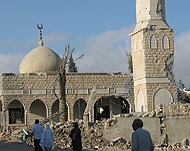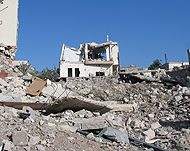‘Lebanese working very hard to rebuild’
Israel completed its withdrawal from Lebanese territory this week but local and international relief workers say the army has left a trail of destruction and devastation in its wake.

According to the Lebanese interior ministry, at least 1,180 people were killed during the conflict, a third of them children, while another 4,036 were injured.
Around 15,000 homes were destroyed and 80 vital bridges are now unusable.
Ray Jureidini is an associate professor of sociology and the acting director of the Forced Migration and Refugee Studies department at the American University in Cairo.
Jureidini is part of a task force initiative on relief and recovery in Lebanon from where he recently returned.
He says he saw a nation still traumatised by the 33-day conflict that ended on 15 August but that the Lebanese are slowly rebuilding and reviving their economy.
Aljazeera.net: It has been nearly two months since the ceasefire between Israel and Lebanon took hold. How is Lebanon’s recovery and reconstruction faring?
Ray Jureidini: It is very slow of course. It requires a lot of organisation, money, and people to assist – those from within the country and those volunteers willing to assist coming from abroad.
But the damage is so great and of course, the trauma itself was enormous. There is a sense of quiet throughout the country as I saw it.
People are working very hard to repair and try to regain their former normal state … if there ever was a normal state in Lebanon because there has always been a sense of destabilisation … because of all the factions and the constant threats from Israel, such as the continued violation of Lebanese airspace by Israeli warplanes.
 |
|
The village of Bint Jbeil has |
There are so many thousands of displaced who are living outside their homes because these were destroyed during the conflict.
The normalisation process also requires delivery and access to basic staple requirements such as medicines, food – there are many people providing those and aid is coming in, but it is slow.
The financial assistance pledges typically have not all been fulfilled, the countries which have pledged money … all that money does not come in all out once but in drips and drabs.
There is a massive clean-up operation, I saw people with brooms cleaning the streets of the rubble and debris from the destroyed buildings. This is everywhere.
The trauma itself slows people down – just looking at the massive damage to the southern village of Bint Jbeil, for example, it is stunning.
What are the most immediate needs for the relief effort in the country?
The Lebanese are pretty resilient and smart. But the most pressing need is to get rid of the landmines, cluster bombs, and unexploded ordnance around the country.
This is critical because people are still being killed and maimed by these weapons, so in a sense the war is still being waged because of the ordnance the Israelis have left behind.
To the best of my information, the Israelis have still not yet disclosed information about where they planted their landmines, which takes us back to 2000 when the Israelis left the south of the country. But now the situation has been worsened by the cluster bombs throughout southern Lebanon.
There is a need for safety on the roads for transports to go in and out to bring food and other necessities such as medical supplies.
Lebanon needs to develop sustainable progress – things that are going to endure for a long time. People are already starting to set up bakeries in strategic areas hard hit by the bombing.
There is a move in Lebanon to redevelop and repair in such a way that the country can be in a safer position if the same thing occurs again in the future.
One of the issues was that there were not enough safe havens for civilians to escape to in the case of such conflict.
Did you feel there was a fear of continuing political and military instability in the country?
Absolutely. There are tremendous divisions in the country. There are people who do blame Hezbollah and say the group triggered this attack, although the disproportionate Israeli response could not have been foreseen.
Apparently, the Americans knew all about it because it was all pre-planned but there are people in Lebanon who still do not know about that and accept that Hezbollah’s actions triggered the whole war. There are divisions and blame is being exchanged back and forth.
 |
|
Many people cannot return home |
I did meet people who complained that all the aid was going to Hezbollah or to Shia Hezbollah areas, something they could not understand because – as they said – they weren’t the only ones who were killed. There is a sense that sects are looking after their own, although you certainly have aid organisations and NGOs and volunteer groups who have been showing their support and solidarity with the Lebanese people regardless of political persuasion or religious sect.
Why have internally displaced people not returned to their homes?
Because their homes have been destroyed. They are living in other people’s houses, hotels, temporary shelters and so on.
It is a question of repair and redevelopment. I am not sure anyone has any precise figures indicating how many have returned to their homes and how many of those have been able to resume living in their dwellings.
What is the task force on Lebanon doing?
This is an initiative by students and faculty – supported by the administration – of the American Uiniversity in Cairo. The organisation, Nussrah, has established a campaign to raise funds to assist the needy both in Beirut and in southern Lebanon.
The students established relationships with the medical associations in Egypt to provide medical relief and funds for the repair of the hospital in Sidon.
A student delegation will head to Lebanon to see where the donations will be best placed.
Lebanese I have spoken with, want people in the region to help, to put their labour into construction work in the country, show their support and solidarity.
But you can’t just jump in – the Lebanese have their own integrity and you can’t make them feel like they are totally destitute. The Lebanese are a very resilient and very proud people.
All pictures by Ray Jureidini